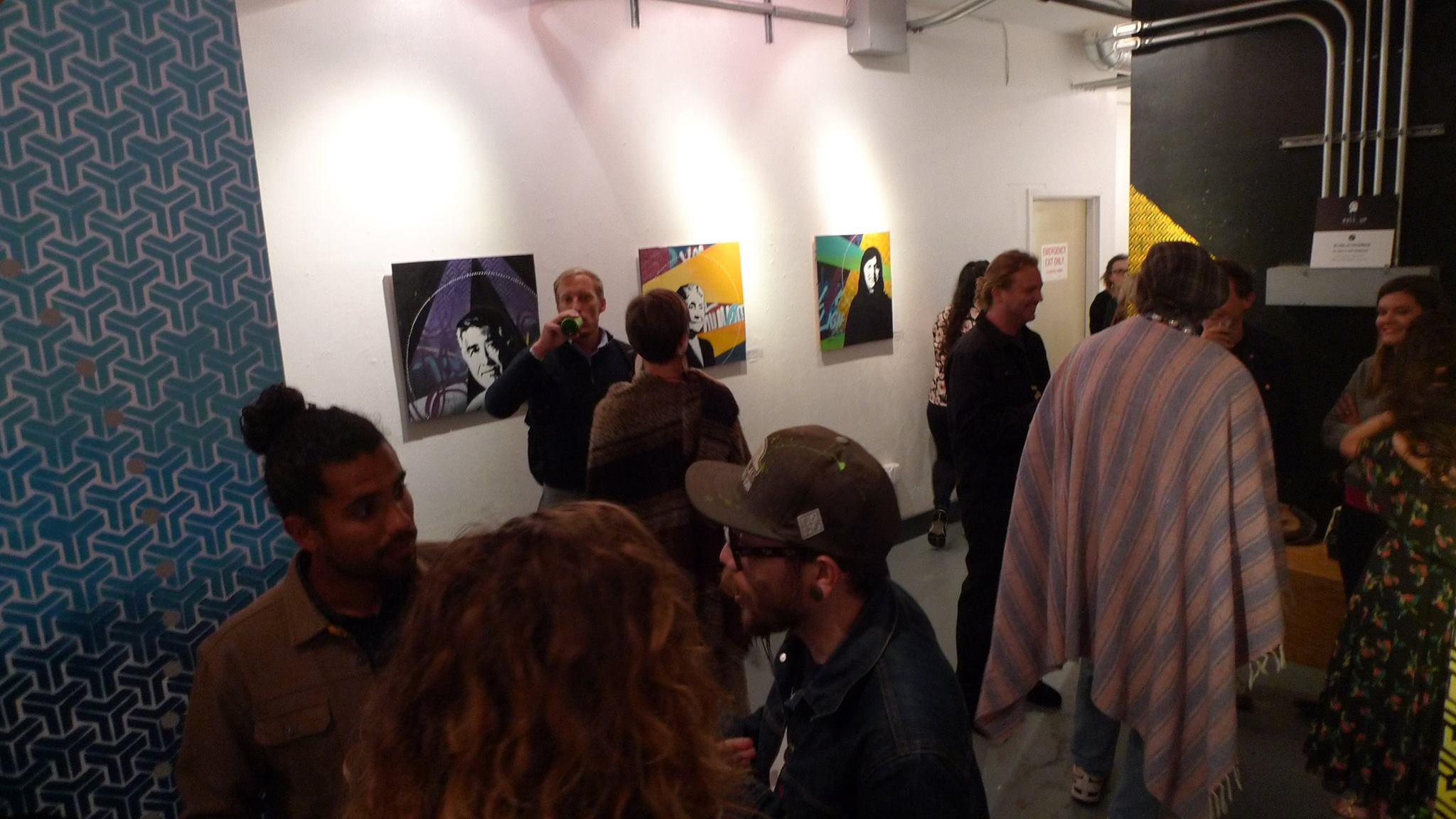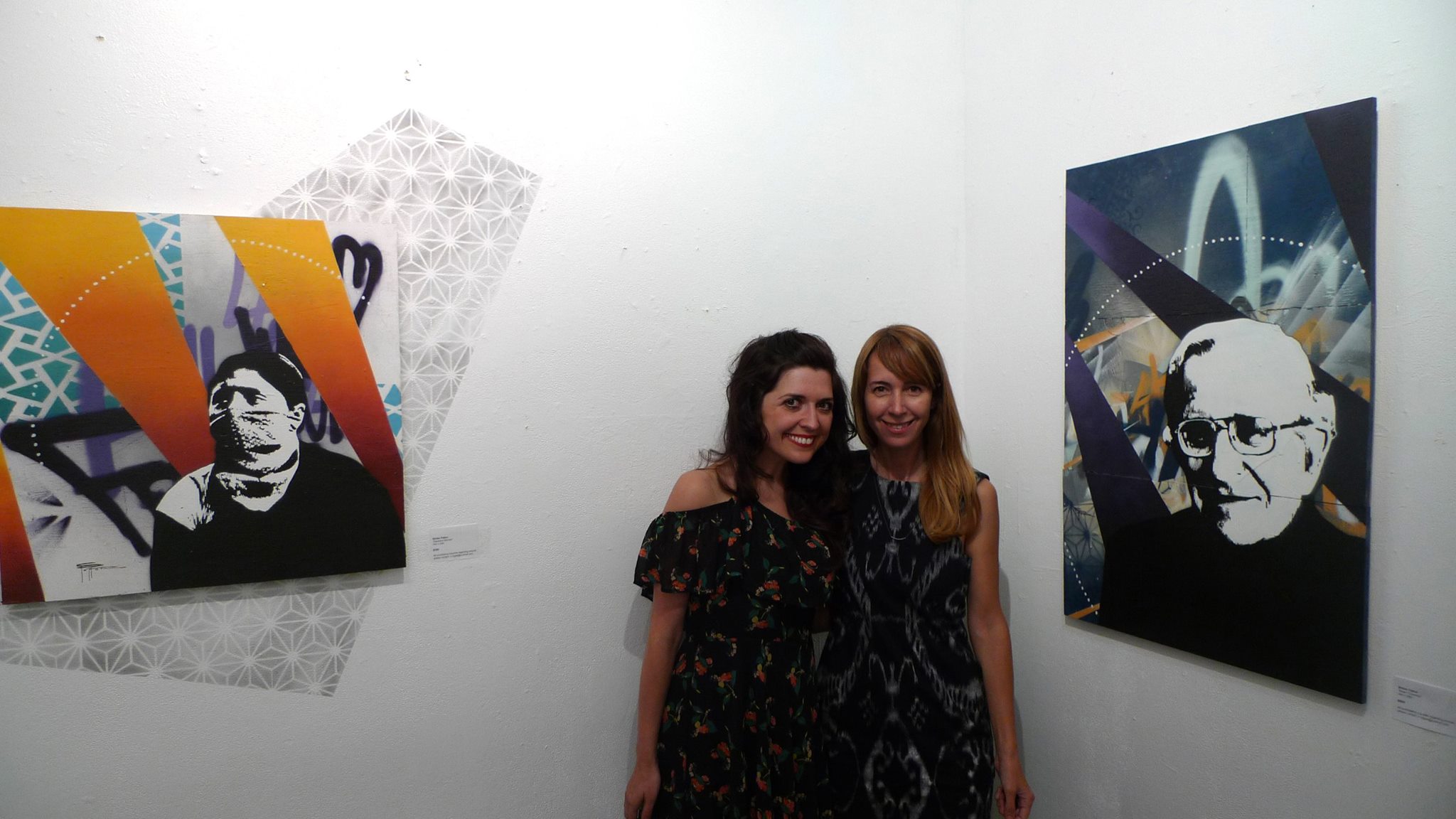I recently opened my first solo show in San Francisco, CA, at Roll Up Gallery in the Mission District. The show is titled "Idols" and will run for one month, from July 29th to August 29th 2016.
This series is made to celebrate and honor those who have shared their skills, experiences, and passions to help make the world a better place. Todays world has a false sense of idolism, with celebrity and stardom status being given to those who only seek to better themselves. Through this work, I have imagined what the world could be like if we idolized those who have and are giving their all for us. What do you think the world would be like if their names were household names instead of those who only care about me?
I created 8 new works that featured an individuals portrait as the main focus of each piece with my halftone stencil style. The background of each work are abstractions of color fields, gradients, patterns, and words and passages with tags and graffiti. Choosing the 8 people to be featured as Idols was at first daunting, with the thought of how I am going to choose just 8, but then exciting. I knew I wanted to feature some well known figures - Gandhi, Cesar Chavez - but also some current activists - Malala Yousafzai, Rigoberta Menchu - and others who many not be as recognized for their social and political work - Helen Keller, Noam Chomsky, Berta Caceres, Zapatista Woman.
I quickly realized in the research phase that I cannot represent everyone in one show. I then thought, "I could have an Idols show every year and still be finding new figures to showcase." The pressure I was feeling for deciding who to represent was then lifted. I was so happy with the final choices, as I have people represented from the past and present, different cultures, different genders, and different struggles. I very much want to have another Idols show in the future.
Idols and Bios:
Berta Cáceres
March 4th 1971- March 3rd 2016
Berta was a Honduran environmental activist, indigenous leader of her people, and co-founder and coordinator of the Council of Popular and Indigenous Organizations of Honduras (COPINH). She won the Goldman Environmental Prize in 2015, for "a grassroots campaign that successfully pressured the world’s largest dam builder to pull out of the Agua Zarca Dam" at the Río Gualcarque. She led campaigns on a wide variety of issues, including protesting illegal logging, plantation owners, and the presence of US military bases on Lenca land. She supported feminism, LGBT rights, as well as wider social and indigenous issues.
She was assassinated in her home by armed intruders, after years of threats against her life. Twelve environmental defenders were killed in Honduras in 2014, according to research by Global Witness, which makes it the most dangerous country in the world, relative to its size, for activists protecting forests and rivers.
Cesar Chavez
March 31st, 1927 - April 23rd, 1993
Cesar was an American labor leader and civil rights activist who co-founded the National Farm Workers Association (later the United Farm Workers union, UFW) in 1962. Originally a Mexican American farm worker, Chavez encountered the conditions that he would dedicate his life to changing: wretched migrant camps, corrupt labor contractors, meager wages for backbreaking work, bitter racism.
He became the best known Latino American civil rights activist, and was strongly promoted by the American labor movement, which was eager to enroll Hispanic members. His public-relations approach to unionism and aggressive but nonviolent tactics made the farm workers' struggle a moral cause with nationwide support. By the late 1970s, his tactics had forced growers to recognize the UFW as the bargaining agent for 50,000 field workers in California and Florida.
For thirty years Chavez tenaciously devoted himself to the problems of some of the poorest workers in America. The movement he inspired succeeded in raising salaries and improving working conditions for farm workers in California, Texas, Arizona, and Florida.
Malala Yousafzai
July 12th, 1997 - present
Malala is a Pakistani activist for female education and the youngest-ever Nobel Peace Prize laureate, in 2014 at age 17. She is known mainly for human rights advocacy for education and forwomen in her native Swat Valley in the Khyber Pakhtunkhwa province of northwest Pakistan, where the local Taliban had at times banned girls from attending school. Yousafzai's advocacy has since grown into an international movement.
Yousafzai attended a school that her father, Ziauddin Yousafzai, had founded. After the Taliban began attacking girls' schools in Swat, Malala gave a speech in Peshawar, Pakistan, in September 2008. The title of her talk was, "How dare the Taliban take away my basic right to education?" In early 2009, Yousafzai began blogging for the BBC about living under the Taliban's threats to deny her an education. In order to hide her identity, she used the name Gul Makai. However, she was revealed to be the BBC blogger in December of that year.
As a child, she became an advocate for girls' education, which resulted in the Taliban issuing a death threat against her. On October 9, 2012, a gunman shot Malala when she was traveling home from school. She survived, and has continued to speak out on the importance of education.
Mahatma Gandhi
October 2nd 1869 - January 30th 1948
Gandhi was the preeminent leader of the Indian nationalism in British-ruled India. Employing nonviolent civil disobedience, Gandhi led India to independence and inspired movements for civil rights and freedom across the world. The honorific Mahatma (Sanskrit: "high-souled", "venerable") — applied to him first in 1914 in South Africa,—is now used worldwide. He is also called Bapu (Gujarati: endearment for "father", "papa") in India. In common parlance in India he is often called Gandhiji. He is unofficially called the Father of the Nation.
Gandhi famously led Indians in challenging the British-imposed salt tax with the 400 km (250 mi) Dandi Salt March in 1930, and later in calling for the British to Quit India in 1942. He was imprisoned for many years, upon many occasions, in both South Africa and India. Gandhi attempted to practise nonviolence and truth in all situations, and advocated that others do the same. He lived modestly in a self-sufficient residential communityand wore the traditional Indian dhoti and shawl, woven with yarn hand-spun on a charkha. He ate simple vegetarian food, and also undertook long fasts as a means of both self-purification and social protest.
Helen Keller
June 27th 1880 - June 1st 1968
Helen was an American author, political activist, and lecturer. She was the first deaf-blind person to earn a bachelor of arts degree. The story of how Keller's teacher, Anne Sullivan, broke through the isolation imposed by a near complete lack of language, allowing the girl to blossom as she learned to communicate, has become widely known through the dramatic depictions of the play and film The Miracle Worker. Her birthplace in West Tuscumbia, Alabama, is now a museum and sponsors an annual "Helen Keller Day". Her birthday on June 27 is commemorated as Helen Keller Day in the U.S. state of Pennsylvania and was authorized at the federal level by presidential proclamation by President Jimmy Carter in 1980, the 100th anniversary of her birth.
A prolific author, Keller was well-traveled and outspoken in her convictions. A member of the Socialist Party of America and the Industrial Workers of the World, she campaigned for women's suffrage, labor rights, socialism, antimilitarism, and other similar causes. She was inducted into theAlabama Women's Hall of Fame in 1971 and was one of twelve inaugural inductees to the Alabama Writers Hall of Fame on June 8, 2015.
Noam Chomsky
December 27th 1978 - present
Noam is an American linguist, philosopher, cognitive scientist, historian, logician,social critic, and political activist. Sometimes described as "the father of modern linguistics", Chomsky is also a major figure in analytic philosophy, and one of the founders of the field of cognitive science. He has spent more than half a century at the Massachusetts Institute of Technology (MIT), where he is Institute Professor Emeritus, and is the author of over 100 books on topics such as linguistics, war, politics, and mass media. Ideologically, he aligns with anarcho-syndicalism and libertarian socialism.
Chomsky is an oft-cited scholar whose work has influenced a wide array of academic fields. He is widely recognized as a paradigm shifter who helped spark a major revolution in the human sciences, contributing to the development of a new cognitivistic framework for the study of languageand the mind. In addition to his continued scholarly research, he remains a leading critic of U.S. foreign policy, neoliberalism and contemporarystate capitalism, the Israeli–Palestinian conflict, and mainstream news media. His ideas in these areas have proved highly significant within the anti-capitalist and anti-imperialist movements.
Rigoberta Menchú
January 9th 1959 - present
Rigoberta is a K'iche' political activist from Guatemala. Menchú has dedicated her life to publicizing the rights of Guatemala's indigenous feminists during and after the Guatemalan Civil War (1960–1996), and to promotingindigenous rights in the country. She received the Nobel Peace Prize in 1992 and the Prince of Asturias Award in 1998. She is the subject of the testimonial biography I, Rigoberta Menchú (1983) and the author of the autobiographical work, Crossing Borders. Menchú is a UNESCO Goodwill Ambassador. She has also become a figure in indigenous political parties and ran for President of Guatemala in 2007 and 2011.
Zapatista Woman
January 1st 1994 - present
The Zapatistas are a revolutionary leftist political and militant group based in Chiapas, the southernmost state of Mexico. They have spokespeople, but no leader. Their strength is in all of them, and Zapatista women have been influential in the movement. Since 1994, the group has been in a declared war "against the Mexican state", and against military, paramilitary and corporate incursions into Chiapas. This war has been primarily defensive. In recent years, it has focused on a strategy of civil resistance. The Zapatistas' main body is made up of mostly rural indigenous people, but includes some supporters in urban areas and internationally.
In the 1990s, one-third of the insurgents were women and half of the Zapatista support base was women. The EZLN organization style involved consensus and participation by everyone, including women and children. Therefore, one aspect of the EZLN’s ideology was gender equality and rights for women. After the Zapatista uprising in Chiapas, the EZLN announced the Women’s Revolutionary Law which was a set of ten laws that granted rights to women regarding marriage, children, work, health, education, political and military participation, and protected women from violence.
Although the ideology of the EZLN reflects libertarian socialism, paralleling both anarchist and libertarian Marxist thought in many respects, the EZLN has rejected and defied political classification, retaining its distinctiveness due in part to the importance of indigenous Mayan beliefs in Zapatismo. The EZLN aligns itself with the wider alter-globalization, anti-neoliberal social movement, seeking indigenous control over their local resources, especially land.
Since their 1994 uprising was countered by the Mexican army, the EZLN has abstained from military offensives and adopted a new strategy that attempts to garner Mexican and international support. Through an Internet campaign, the EZLN was successful in extending an understanding of their plight and intentions to the public. With this change in tactics, the EZLN has received greater support.








